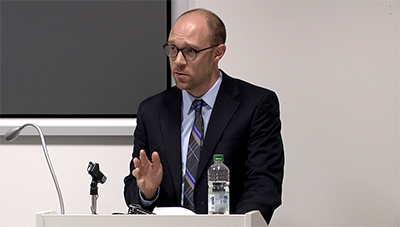Dr Alex Beringer - 21 October 2014 - Paranoid Masculinities: Conspiracy Theory in Mark Twain’s Fiction
Duration: 40 mins 43 secs
Share this media item:
Embed this media item:
Embed this media item:
About this item

| Description: |
Dr Alex Beringer (Montevallo) will present a public leacture.
This talk will explore Mark Twain’s perspective on conspiracy theory in late-nineteenth century America. In Twain’s time, public attitudes towards conspiracy theory went through a somewhat unusual change. Namely, conspiracy theory was becoming increasingly identified with amusement and entertainment. Figures such as Josiah Strong and Ignatius Donnelly drew enormous crowds and sold bestselling books by offering conspiratorial interpretations of history that bore a closer resemblance to P.T. Barnum’s promotions than to conventional political rhetoric. For his part, Twain was ambivalent about these developments. On the one hand, he expressed appreciation for the “solid satisfaction” to be had from a good conspiratorial mystery. Twain even penned a conspiracy theory history on Shakespeare where he commented on his enthusiasm for what he termed the “conjecturability” associated with conspiracy. On the other, Twain also regarded the public’s amusement with conspiracy thinking as a disturbing trend. If historical events were only considered interesting when they provided a thrilling mystery or visceral head rush, this encouraged people to drift towards political insularity and extremism. In tracing these currents in Twain’s thought, the discussion will delve into widely-known works by Twain like Connecticut Yankee in King Arthur’s Court as well as lesser-known pieces such as the unfinished novel Tom Sawyer’s Conspiracy. |
|---|
| Created: | 2014-10-28 15:56 |
|---|---|
| Collection: |
Conspiracy and Democracy
Conspiracy and Democracy |
| Publisher: | University of Cambridge |
| Copyright: | Glenn Jobson |
| Language: | eng (English) |
| Keywords: | CRASSH; Conspiracy and Democracy; Alex Beringer; |
| Abstract: | Dr Alex Beringer (Montevallo) will present a public leacture.
This talk will explore Mark Twain’s perspective on conspiracy theory in late-nineteenth century America. In Twain’s time, public attitudes towards conspiracy theory went through a somewhat unusual change. Namely, conspiracy theory was becoming increasingly identified with amusement and entertainment. Figures such as Josiah Strong and Ignatius Donnelly drew enormous crowds and sold bestselling books by offering conspiratorial interpretations of history that bore a closer resemblance to P.T. Barnum’s promotions than to conventional political rhetoric. For his part, Twain was ambivalent about these developments. On the one hand, he expressed appreciation for the “solid satisfaction” to be had from a good conspiratorial mystery. Twain even penned a conspiracy theory history on Shakespeare where he commented on his enthusiasm for what he termed the “conjecturability” associated with conspiracy. On the other, Twain also regarded the public’s amusement with conspiracy thinking as a disturbing trend. If historical events were only considered interesting when they provided a thrilling mystery or visceral head rush, this encouraged people to drift towards political insularity and extremism. In tracing these currents in Twain’s thought, the discussion will delve into widely-known works by Twain like Connecticut Yankee in King Arthur’s Court as well as lesser-known pieces such as the unfinished novel Tom Sawyer’s Conspiracy. |
|---|---|
Available Formats
| Format | Quality | Bitrate | Size | |||
|---|---|---|---|---|---|---|
| MPEG-4 Video | 1280x720 | 2.96 Mbits/sec | 904.17 MB | View | Download | |
| MPEG-4 Video | 640x360 | 1.9 Mbits/sec | 582.96 MB | View | Download | |
| WebM | 1280x720 | 2.75 Mbits/sec | 841.22 MB | View | Download | |
| WebM | 640x360 | 695.64 kbits/sec | 207.45 MB | View | Download | |
| iPod Video | 480x270 | 491.53 kbits/sec | 146.58 MB | View | Download | |
| MP3 | 44100 Hz | 249.83 kbits/sec | 69.81 MB | Listen | Download | |
| Auto * | (Allows browser to choose a format it supports) | |||||

